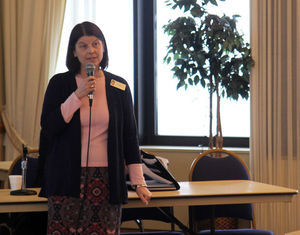Freeman begins program prioritization action plan

Lisa Freeman, executive vice-president and provost, is drafting a roughly 400-page unified action plan to address themes in action plans like more interdisciplinary opportunities for students.
July 25, 2016
Lisa Freeman, executive vice-president and provost, is drafting a roughly 400-page unified action plan to address themes in action plans like more interdisciplinary opportunities for students.
The review and unification of these action plans are steps in the program prioritization process. Program prioritization, which began in 2014, uses task forces to create reports that review 223 academic programs and 236 administrative programs to influence the allocation of university funds. The reports were based on narratives submitted by program leaders in November.
“Students want to be able to tackle important problems with information that they would get from different disciplines,” Freeman said.
Freeman said a significant number of submitted action plans did not require additional funding, but rather utilized existing resources. Those that did require additional funding will be worked into the multi-year budget plan.
Some action plans proposed opportunities to raise funds for academic initiatives. Freeman said that program leaders discussed potential donors that would likely be interested in funding such initiatives. Freeman organized these suggestions, along with other information, into a number of tables within the unified plan. These tables are meant to organize key ideas for cabinet members.
The action plan will affect the priorities for hiring faculty and staff positions due to a number of personnel requests that were submitted during the program prioritization process. Hiring for positions discussed in these personnel requests will be addressed.
Freeman said routine actions, such as the phase out or introduction of a course, already commonly occur at the university, so these actions will likely require less planning.
“We add programs and delete programs all of the time,” Freeman said. “Something like that can move forward, in most cases, without a lot of additional discussion.”
Significant actions will require more planning. Planning may include the creation of a timeline, research about necessary resources and a higher volume of meetings, Freeman said.
Freeman, along with the other members of President Doug Baker’s cabinet, are now focusing on discussing the unified action plan during their regularly scheduled cabinet meetings. The first meeting focused on this was held last Wednesday.













